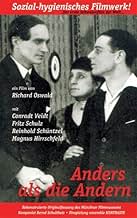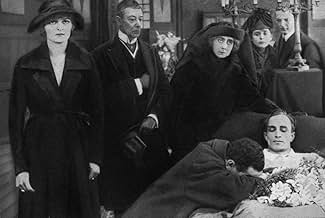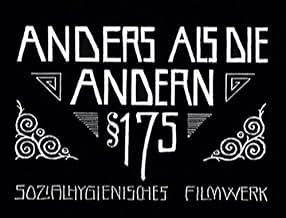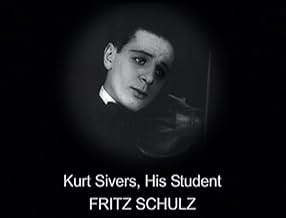PUNTUACIÓN EN IMDb
7,0/10
1,6 mil
TU PUNTUACIÓN
Dos músicos se enamoran, pero el chantaje y el escándalo hacen que el romance de un giro trágico.Dos músicos se enamoran, pero el chantaje y el escándalo hacen que el romance de un giro trágico.Dos músicos se enamoran, pero el chantaje y el escándalo hacen que el romance de un giro trágico.
Argumento
¿Sabías que...?
- CuriosidadesMagnus Hirschfeld, a prominent sexologist, co-wrote the screenplay and made a cameo appearance as The Doctor, with whom Paul Korner consults. A scene resembling that of the modern-day LGBT scene existed in Weimar Germany, albeit underground, and the scene at the gay bar featured actual LGBT individuals. The screenwriter and author Anita Loos said of this period, in 1923: "Any Berlin lady of the night might turn out to be a man: the prettiest girl on the street was Conrad Veidt, who later became an international film star." (It was Hirschfeld who coined the term 'transvestism.')
- Versiones alternativasThere is an Italian edition of this film on DVD, distributed by DNA srl, "DIVERSI DAGLI ALTRI: Alle Origini Del Cinema Gay - Special Edition" (4 Films on a single DVD: Mikaël, 1924 + Fireworks, 1947 + Un chant d'amour, 1950 + Anders als die Andern, 1919), re-edited with the contribution of film historian Riccardo Cusin. This version is also available for streaming on some platforms.
- ConexionesEdited into Gesetze der Liebe (1927)
Reseña destacada
Conrad Veidt plays a famous musician who is blackmailed for being gay. Eventually he stands trial and is convicted. At the end the Film pleads for the abolition of § 175(The Paragraph which punishes homosexuality).
The making of such a film was only possible because after WWI there were no Censorship laws in Germany. After a wave of sexually explicit films they were reinstalled and 'Anders als die andern' was banned for the public in Aug.1920. Not until 1957 would homosexuality be a main topic in a film again (Anders als Du und Ich).
Sadly this historic film is lost. But Portions of it were incorporated into another film (Gesetze der Liebe/Laws of Love,1927) and survived. These have been restored to a length of 41 min..
The making of such a film was only possible because after WWI there were no Censorship laws in Germany. After a wave of sexually explicit films they were reinstalled and 'Anders als die andern' was banned for the public in Aug.1920. Not until 1957 would homosexuality be a main topic in a film again (Anders als Du und Ich).
Sadly this historic film is lost. But Portions of it were incorporated into another film (Gesetze der Liebe/Laws of Love,1927) and survived. These have been restored to a length of 41 min..
- rengeo
- 6 mar 2002
- Enlace permanente
Selecciones populares
Inicia sesión para calificar y añadir a tu lista para recibir recomendaciones personalizadas
- How long is Different from the Others?Con tecnología de Alexa
Detalles
- Fecha de lanzamiento
- País de origen
- Idiomas
- Títulos en diferentes países
- Different from the Others
- Localizaciones del rodaje
- Berlín, Alemania(unknown scenes)
- Empresas productoras
- Ver más compañías en los créditos en IMDbPro
- Duración50 minutos
- Color
- Mezcla de sonido
- Relación de aspecto
- 1.33 : 1
Contribuir a esta página
Sugerir un cambio o añadir el contenido que falta

Principal laguna de datos
By what name was Diferente a los demás (1919) officially released in India in English?
Responde














